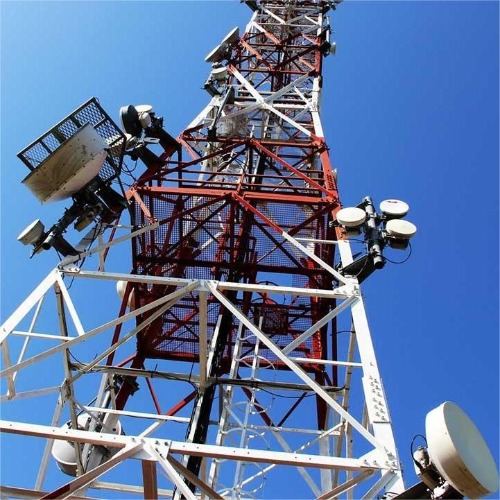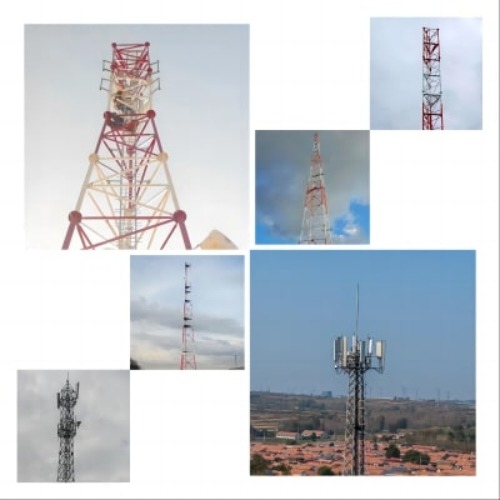The rollout of 5G-Advanced (5G-A) marks a seismic shift in mobile connectivity—delivering 10x faster speeds (up to 10 Gbps downlink), ultra-low latency (milliseconds), and massive device connectivity (millions/km²). Yet, this leap hinges on an unsung hero: communication towers. From angle steel towers and monopole towers to tubular towers and rooftop towers, these structures are evolving to meet 5G-A’s technical demands while unlocking transformative applications.

1. Density & Deployment Flexibility:
Challenge: 5G-A’s high-frequency bands (e.g., mmWave) have limited coverage, demanding denser base stations. Traditional macro-towers (angle steel tower) alone can’t bridge gaps cost-effectively.
Innovation: Towers now integrate multi-level deployments:
Macro-towers: Anchor wide-area coverage using 3D beamforming for rural/highway corridors.
Micro-sites: Leverage street furniture (light poles, traffic signals) for urban hotspots. In China, micro-towers achieve 85% social resource utilization, slashing deployment costs.
Example: Along China’s Jingnan High-Speed Rail, 48 "micro-towers" on bridges solved lake-crossing coverage—cutting costs by 66% vs. conventional cables.
2. Power & Efficiency Upgrades:
Challenge: 5G-A base stations consume 3–4x more power than 4G, straining grid infrastructure.
Tower Solutions:
Smart Power Systems: AI-driven "peak-shaving" dynamically adjusts power use, reducing grid stress and electricity fees.
Renewable Integration: Solar/battery hybrids power remote towers, while retired EV batteries are repurposed for backup—scaling >2 GWh in China.
New Antenna Demands: 5G-A’s Massive MIMO and beamforming require larger, heavier antennas. Monopoles are reinforced to handle weight, while rooftop towers use stealth designs to blend into cities.
Sensing Integration: For applications like drone traffic monitoring, towers embed radar, cameras, and AI processors. Huawei’s 5G-A "communication-sensing base stations" track drones within 300m altitudes—turning towers into "air traffic controllers".

--Application Frontiers: Where 5G-A and Towers Redefine Industries
1. Low-Altitude Economy:
Tower as Drone Hubs: China Tower deploys drone nests atop communication towers, offering charging/parking. Drones fly from tower A→B→C, expanding coverage radius 5x.
Sensing-Network Fusion: 5G-A’s integrated sensing detects drones in real-time. In Shenzhen, base stations map flight paths over skyscrapers, enabling safe delivery logistics.
2. Smart Cities & Digital Twins:
From Tower to "Digital Sentinel": China’s 210,000+ towers now host environmental sensors, cameras, and edge servers. In the Yangtze River Basin, towers scan 97km of waterways for illegal fishing—reducing violations by 80%.
Edge Computing: Tubular towers house micro-data centers, processing traffic/security data locally—critical for latency-sensitive apps like autonomous driving.
3. Industrial IoT Revolution:
5G-A + RedCap: Lightweight 5G-A (RedCap) connects massive sensors cost-effectively. Towers deploy customized micro-stations in factories (e.g., ports, mines), enabling real-time machinery control and AR maintenance.
Case: Tianjin Port’s 5G-A network uses tower-mounted RedCap sensors to coordinate cranes and AGVs—boosting efficiency by 30%.

Tower Infrastructure as a Service: Shared towers (95% in China) will host satellite links for 5G-A/6G non-terrestrial networks.
AI-Driven O&M: Predictive maintenance via tower-mounted AI slashes upkeep costs—China Tower’s "Four Special Actions" reduced tenant fees by 20%.
Regulatory Shift: Governments now mandate tower-sharing (e.g., China’s "one tower, multiple uses") and streamline permits for rooftop/social deployments.
*References: China Tower Tech Innovations, GSMA 5G-A Deployment Forecasts, Industrial Case Studies*